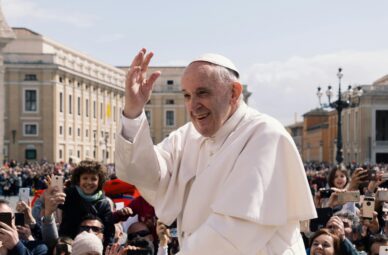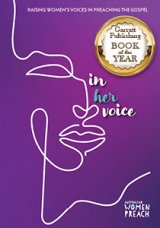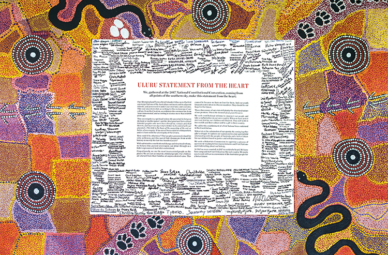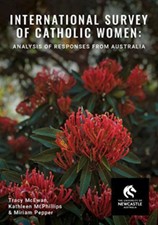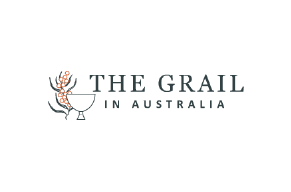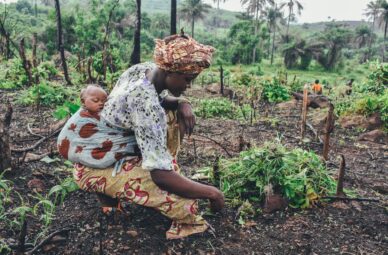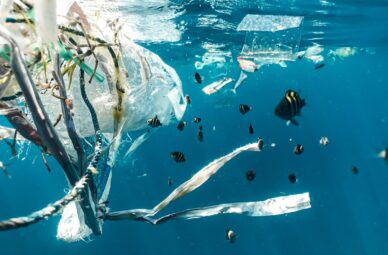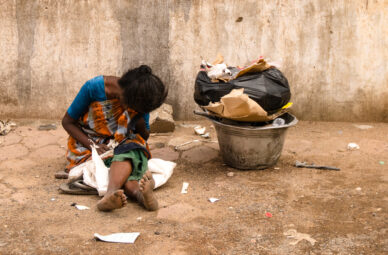
Reclaiming Our Heritage
May 11, 2017Welcome to the second in a five-part series written by Patricia Gemmell on the topic of Eco-Spirituality.
Part 1 The Context for Ecological Theology and Spirituality
Part 2 Reclaiming our heritage
Part 3 God the Trinity
Part 4 Women's voices
Part 5 Eco-Spirituality
Part 2
The Canticle of the Creatures
Most high, all powerful, all good Lord!
All praise is Yours, all glory, all honour, and all blessing.
To You, alone, Most High, do they belong.
No mortal lips are worthy to pronounce Your name.
Be praised, my Lord, through all Your creatures,
especially through my lord Brother Sun,
who brings the day, and You give light through him.
And he is beautiful and radiant in all his splendour!
Of You, Most High, he bears the likeness.
Be praised, my Lord, through Sister Moon and the stars;
in the heavens, You have made them bright, precious and beautiful.
Be praised, my Lord, through Brothers Wind and Air,
and clouds and storms, and all the weather,
through which You give Your creatures sustenance.
Be praised, my Lord, through Sister Water;
she is very useful, and humble, and precious, and pure.
Be praised, my Lord, through Brother Fire,
through whom You brighten the night.
He is beautiful and cheerful, and powerful and strong.
Be praised, my Lord, through our sister Mother Earth,
who feeds us and rules us,
and produces various fruits with coloured flowers and herbs.
Be praised, my Lord, through those who forgive for love of You;
through those who endure sickness and trial.
Happy those who endure in peace,
for by You, Most High, they will be crowned.
Be praised, my Lord, through our sister Bodily Death,
from whose embrace no living person can escape.
Woe to those who die in mortal sin!
Happy those she finds doing Your most holy will.
The second death can do no harm to them.
Praise and bless my Lord, and give thanks,
and serve Him with great humility.
Introduction
I thought it would be appropriate to begin this article with St Francis’ song of praise to the Creator. The experience of wonder we have when we look at the natural world and the love and the praise of God that it can arouse: these are important elements of eco-spirituality. They have been with Christianity from the very beginning, and yet somewhere along the way they have become marginal rather than central to our Christian practice. We need to reclaim wonder and praise for our spiritual lives.
We also need to reclaim our sense of gratitude, our sense that everything we receive is a gift. As Pope Francis tells us, “creation can only be understood as a gift from the outstretched hand of the Father of all, and as a reality illuminated by the love which calls us together into universal communion” (LS 76).

In my first article, I spoke about two stories, the wondrous story of how the universe came to be and how it continues to evolve, and the devastating story of the manmade destruction of the earth. These two stories, both individually and together, have been changing people’s perceptions all around the world, for a number of decades now, leading to movements and organisations devoted to promoting sustainable development and lifestyles and the continuation of a rich bio-diversity on the planet.
Why do we need ecological theology?
There are many groups you could join tomorrow to make a difference. In this context, you might ask yourself the question, “Why do we need ecological theology?” I believe that eco-theology matters, for two reasons. First, I believe Christian theology has a moral responsibility to make amends for a past that has not served the earth well. Our focus on sinful humanity and our preoccupation with the next world have both taken our gaze away from the earth as a serious theological concern. Paul Collins, an Australian theologian, goes so far as to say that “throughout its history, Christianity has injected a negative approach to the natural world into its theology” (Collins 1995, 96). Thomas Berry is even more critical: “The greatest failure of Christianity,” he says, “in the total course of its history is its inability to deal with the devastation of the planet” (Collins 1995, 152).
Second and more importantly, Christianity has something positive to offer. In one sense, this “something positive” is timeless, is what Christianity has always offered: the hope of conversion and personal transformation through Jesus Christ, only today the conversion is an ecological one, personal transformation is transformation into someone who lives simply and treads lightly upon this earth, and new lights are shone upon the person and meaning of Jesus. However, it is also the case, I think, that for people of faith the theological understanding of why we should seriously turn our attention to the earth has significant power to change us. And I also suspect that for some, it is only a theological understanding that will truly change them. It is certainly my own experience that new theological insights have radically changed me. Ecological theology has its own important part to play in transforming people of faith.
I find eco-theology exciting. It is filled with a sense of urgency, an awareness that we are at a crucial juncture in history – “an elbow of time” as the Grail founder, Fr. Jacques van Ginneken would have called it. Unless we change and change radically, we will destroy the earth as we know it and ourselves along with it. Eco-theology is ground-breaking, it is certainly challenging and sometimes conceptually difficult, but it is always fresh and new. It registers wonder, mystery and awe and invites the reader (or listener) to enter the mystery and be transformed.
While it definitely breaks new ground, one of its important tasks has been to reclaim some of the riches of our tradition, and here I am talking about the creation theology that has always been with us, though pushed to the margins in the last 500 years and often neglected or forgotten by the teaching bodies of the Christian churches. So in this article, I would like to look at the Christian creation story in Genesis.
Genesis, creation and eco-theology
We know this story is not the literal truth. But we do believe that it contains theological truth. What does it tell us about creation? I think we all know that it is good and even very good. That it is God’s abundant gift and that God blesses it. But how deeply do we really know that?
Diarmuid O’Murchu contends that perhaps the first step in ecological conversion is “to understand our universe in terms of blessing rather than of curse…The shift in awareness from viewing the world as an object to be conquered to seeing it as a gift to be received begins an expansion of mind and heart….In our commercial, consumerist world we have lost virtually all sense of this cosmic generosity” (O’Murchu 1995).
Original Blessing by Matthew Fox came out in 1983 and was one of the most read and influential spiritual books of the 1980’s. It preached original blessing rather than original sin and its insights were felt to be liberating for many people. I can say from personal experience that I found it to present a liberating view of the world and perhaps reading it 25 years ago was the start of my own ecological conversion. It is probably still a good book to read. However, to get back to my question: how deeply do we know that creation is God’s abundant good gift? Do we feel it in the core of our being? Does it live in our hearts as the source of all our actions? Because this is what is absolutely necessary. Eco-theology can give us the motivation to change, but unless the knowledge lives in our hearts, we will not be changed. We need to develop a spirituality that will lead us to conversion and give us the inner strength we need to nurture and sustain that conversion.
As Christians, we have a store of riches in our Sacred Scripture to turn our hearts and minds to the wonder and mystery of God’s creation, to God’s presence therein, and to our own humble but unique and responsible place as one creature in the interconnected web of life. We have beautiful psalms of praise to the Creator and all creation, particularly Psalms 104 and 148. We have the Wisdom literature: Proverbs, Job, the Song of Songs, Ecclesiastes, the book of Wisdom and Sirach.
The book of Job, in chapters 38-41, contains the longest sustained piece of writing on nature in the Bible, and I urge you to study it if you are not already familiar with it. In the words of Elizabeth Johnson, “its theological vision offers a strong antidote to the human arrogance that has flowed in the modern era from the view of dominion as domination” (Johnson 2014, 269). It is an amazing piece of writing that highlights the otherness of God and of God’s creatures and puts Job firmly in his place, which is not the centre of everything, but next to everything else. God hammers Job with question after question: “Where were you when the Earth was measured out when the stars began to sing together when the sea was placed within boundaries and its proud waves given limits? Have you commanded the light to rise at dawn? The snow and rain to fall even where no one lives? The thunder and lightning to play? Orion and the other constellations to run their courses across the sky?” (Johnson 2014, 269-270). We human beings are truly put in our place here.

Who gave the wild donkey his freedom,
and untied the rope from his proud neck?
I have given him the desert for a home,
the salt plains as his own habitat.
He scorns the turmoil of the town:
there are no shouts from a driver for him to listen for.
The mountains are the pastures that he ranges
in quest of any type of green leaf or blade.
(Job 39: 5-8)
Each creature is loved for its own sake, in all its wildness and integrity, and we are afforded the possibility of deeply sharing God’s delight and love. By the end of this magnificent speech, Job, and the reader along with him have grasped an intimation of a God far greater than we can even begin to imagine, but also an intimation of a different way of being in the cosmos, a way of being marked by both humility and joy. Johnson endorses such a response to God’s voice in the whirlwind, so that “humbled and delighted by the other life around us, we can grow to know ourselves as members of the community of creation and step up to protect our kin” (Johnson 2014, 273).
Jesus and nature
And of course, there is the life of Jesus in the gospels. In Laudato Si’, Pope Francis devotes 5 paragraphs to “the gaze of Jesus,” to show us what we can learn from him.
Let me summarise briefly for you: “In talking with his disciples, Jesus would invite them to recognise the paternal relationship God has with all his creatures…As he made his way throughout the land, he often stopped to contemplate the beauty sown by his Father, and invited his disciples to perceive a divine message in things…Jesus lived in full harmony with creation, and others were amazed…He was far removed from philosophies which despised the body, matter and the things of the world…In the Christian understanding of the world, the destiny of all creation is bound up with the mystery of Christ, present from the beginning…the creatures of this world no longer appear to us under merely natural guise because the risen One is mysteriously holding them to himself and directing them towards fullness as their end. The very flowers of the field and the birds which his human eyes contemplated and admired are now imbued with his radiant presence (96-100).”
Denis Edwards has written about ecology from just about every theological perspective there is, so it is not surprising he has written a book called Jesus and the Natural World. In this book, he writes, “The importance of the natural world to Jesus can be glimpsed in two aspects of his life and ministry: his preaching of the kingdom of God in parables taken from the natural world and his prayer to God outside” (Edwards 2012, 27).
With respect to the parables, he considers they “are the work of one who sees the natural world as the gift of God and as the place of divine presence” (Edwards 2012, 28). I will leave it to you to go back to the gospels and discover this for yourselves. And when you do, see how often Jesus prays in the open air, starting with his temptation in the wilderness for 40 days and finishing in the garden of Gethsemane. We could learn much from Jesus’ relationship with creation, as well as what he says about it.
Look at the birds of the air; they neither sow nor reap nor gather into barns, and yet your heavenly Father feeds them…Consider the lilies of the field, how they grow; they neither toil nor spin, yet I tell you, even Solomon in all his glory was not clothed like one of these…Are not two sparrows sold for a penny? Yet not one of them will fall to the ground apart from your Father. (Mt 6: 26, 28-9; 10: 29)
Are you aware that there has been Catholic teaching on ecology for the past 25 years? Our Pope Francis’ recent encyclical didn't just appear out of the blue but has a solid foundation in recent Church teaching. On 1 January 1990 Pope John Paul II issued a document for the World Day of Peace, entitled “Peace with God the Creator; Peace with all of Creation”, which he began by saying that “a new ecological awareness is beginning to emerge which, rather than being downplayed, ought to be encouraged to develop into concrete programmes and initiatives.”
In various encyclicals and documents, he spoke out against environmental destruction and encouraged ecological conversion. Benedict XVI took a similar approach and it is well worth reading his World Day of Peace Message in 2010, “If You Want to Cultivate Peace, Protect Creation.” I want to look at what he says there about God giving dominion to Adam over all the earth. We know that this idea gave legitimacy for centuries to Western civilisation’s exploitation of the earth’s resources. We know that Christianity has to accept some responsibility here. This is what Benedict says:
Human beings let themselves be mastered by selfishness; they misunderstood the meaning of God’s command and exploited creation out of a desire to exercise absolute domination over it. But the true meaning of God’s original command, as the Book of Genesis clearly shows, was not a simple conferral of authority, but rather a summons to responsibility…Biblical Revelation made us see that nature is a gift of the Creator, who gave it an inbuilt order and enabled man to draw from it the principles needed to “till it and keep it” (cf. Gen. 2:15). Everything that exists belongs to God, who has entrusted it to man, albeit not for his arbitrary use. Once man, instead of acting as God’s co-worker, sets himself up in place of God, he ends up provoking a rebellion on the part of nature, “which is more tyrannized than governed by him”. Man thus has a duty to exercise responsible stewardship over creation, to care for it and to cultivate it.
Pope Francis, too, is well aware of how much Western civilisation has been influenced by a misunderstanding of God’s command in Genesis. He says:
Although it is true that we Christians have at times incorrectly interpreted the Scriptures, nowadays we must forcefully reject the notion that our being created in God’s image and given dominion over the earth justifies absolute domination over other creatures. The biblical texts are to be read in their context, with an appropriate hermeneutic, recognising that they tell us to “till and keep” the garden of the world (cf. Gen 2:15). “Tilling” refers to cultivating, ploughing or working, while “keeping” means caring, protecting, overseeing and preserving. This implies a relationship of mutual responsibility between human beings and nature. Each community can take from the bounty of the earth whatever it needs for subsistence, but it also has the duty to protect the earth and to ensure its fruitfulness for coming generations. (LS, 67)
I would like to make one other point about Genesis 2:15, “The LORD God took the man and put him in the garden of Eden to till it and keep it.” The Hebrew word that we usually translate into English as “to till” or “to work” is abad, which also means “to serve.” Now that’s an interesting thought – our human vocation is to serve the earth. That makes sense in light of the fact that Jesus of Nazareth came to serve and not to be served (Mt 20:28).
Franciscan spirituality
I would like now to talk about Care for Creation: A Franciscan spirituality of the Earth, written by three people, Ilia Delio, Keith Douglass Warner and Pamela Wood. I want to talk about this publication for two reasons. First, because they not only acknowledge that we, the reader, have to go beyond the theology to reflect deeply and pray and act but because they devote several chapters to practical suggestions for ways in which we can develop our eco-spirituality and our eco-praxis. I highly recommend it.
The other thing I want to talk to you about is Franciscan spirituality. Here is another treasure in our Christian heritage that we would do well to reclaim for the present moment. First, there is the life of St Francis himself which can serve as a model of life for us. Pope Francis says, “I believe that Saint Francis is the example par excellence of care for the vulnerable and of an integral ecology lived out joyfully and authentically” (Laudato Si’, 100).
He lived a physically hard life of penance, understandably not one that greatly appeals to us, even though we would embrace his loving relationship to the whole of creation. Where did he find the motivation and the courage to live such a countercultural but joyful life? The same as where many of us find such motivation and courage: in our relationship to the divine, nurtured through Scripture, reflection, prayer, and loving service of others.

There are two important insights here for ecological conversion. First, there is the idea that creation is a reflection, or revelation, of God. The great St Augustine had said that there were two books revealing God, the book of nature and the book of Scripture.
This is what he said: “Others, in order to find God, will read a book. Well, as a matter of fact, there is a certain great big book, the book of created nature. Look carefully at it top and bottom, observe it, read it. God did not make letters of ink for you to recognise him in; he set before your eyes all these things he has made. Why look for a louder voice? Heaven and earth cries out to you, 'God made me.' You can read what Moses wrote; in order to write it, what did Moses read, a man living in time? Observe heaven and earth in a religious spirit” (Johnson 2014, 152).
A sense of kinship
In the 12th and 13th centuries, Hildegard of Bingen, Francis of Assisi, Bonaventure and Thomas Aquinas all spoke of creation as something that communicated to us the knowledge and the presence of the divine. And then the Church in the main seems to have lost sight of this. Eco-theology and spirituality are reclaiming this from our Christian heritage, as it is also reclaiming the notion of our kinship with creation. Indeed this is perhaps one of the most obviously important themes in the literature. It strikes at the heart of our belief that humans stand at the apex of the created order, superior to everything else and thus it is the most powerful antidote we have to deal with the biodiversity crisis.
If we could see ourselves differently, as brother or sister to every living thing, then we would not be indifferent to the accelerating rate of extinction of species; we would do something to stop it. Furthermore, this notion of kinship, which we can apprehend in some of the Hebrew psalms and in Francis’ Canticle, is firmly grounded in science and is something that the deep ecologists have believed for a long time. As Elizabeth Johnson so eloquently puts it, “A community of descent is the hidden bond that ties together all living beings into one narrative of life and death stretching over millions of years. Darwin’s theory uncovers the inner affinity of all organic beings to one another” (Johnson 2014, 63).
Denis Edwards is a renowned Australian eco-theologian and writer of many books and I had the good fortune to attend a three-day seminar of his a few years ago. He speaks passionately about our relationship to other creatures and you have the distinct feeling that he cares deeply about them. He calls them sacraments of divine presence. He believes that we must imitate God in caring for every little sparrow that falls. He proposes that the Bible’s vision of reality is centred on God and not on humanity and that this provides us with just the framework we need for developing our theological understanding of kinship with creation.

There is a real cyclical pattern here, isn’t there? Francis’ spiritual life with Christ made him see every creature as a brother or sister, while they, in turn, showed him Christ. You have the sense of an ongoing and deepening dialogue that Francis had with Christ and the world, leading him ever closer to the mystery of God.
Francis can teach us much as we try to move our ecological knowledge from our heads to our hands and our hearts. We need to reflect and pray deeply and we need to take action. In Care for Creation the authors understand this and provide exercises and ideas to get us thinking, feeling and acting. They provide a Franciscan ecological examination of conscience – it’s very challenging, I can assure you. They provide practical suggestions for how to simplify your life, build a supportive community, take action in your community.
Each one of us will have our own unique way of dealing with the challenge of ecological conversion, but if it is real it will effectively take us out of our comfort zones and effect a radical change in our lives.
References
Collins, Paul 1995, God’s Earth: Religion as if matter really mattered, Dove, North Blackburn.
Delio, Ilia, Warner, Keith Douglas and Wood, Pamela 2008, Care for Creation (a franciscan spirituality of the earth), Franciscan Media, Cincinnati, Ohio.
Edwards, Denis 2012, Jesus and the Natural World: Exploring a Christian Approach to Ecology, Garratt publishing, Mulgrave.
Francis 2015, Laudato Si.
Johnson, Elizabeth A. 2014, Ask the Beasts: Darwin and the God of Love, Bloomsbury, London.

Patricia is a wife, mother of four, and a retired teacher of French, Latin and Italian. She graduated with a Masters in Theology at Newcastle University in 2014. She is a member of the Sydney Grail group and currently serves on their national leadership team.





